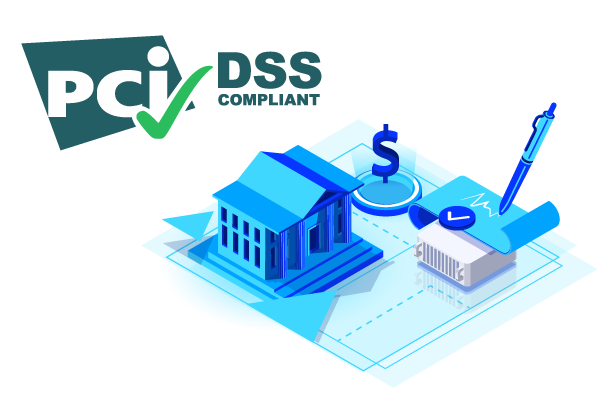Close
Close
PCI DSS, or Payment Card Industry Data Security Standard, is an information security standard for businesses that handle branded credit cards from major card brands, including Visa, MasterCard, American Express, Discover, and JCB.
The primary goal of PCI DSS is to reduce the risk of debit and credit card data loss, commonly known as card fraud. It provides a baseline of technical and operational requirements designed to protect cardholder data. PCI DSS applies to all entities involved in payment card processing — including merchants, processors, acquirers, issuers, service providers, and all other entities that store, process, or transmit cardholder data.
PCI DSS is administered and managed by the PCI SSC (Payment Card Industry Security Standards Council), an independent body that the major payment card brands created. Compliance with PCI DSS is enforced by the payment card brands, not by any government agency, and non-compliance can result in hefty fines.
There are six main goals of the PCI DSS:
1. Build and maintain a secure network and systems.
2. Protect cardholder data.
3. Maintain a vulnerability management program.
4. Implement strong access control measures.
5. Regularly monitor and test networks.
6. Maintain an information security policy.
Each of these goals has a set of specific requirements that an organization must meet in order to be considered compliant. The level of compliance required depends on the volume of transactions an organization processes each year and can range from filling out a self-assessment questionnaire to undergoing a full-scale audit by a Qualified Security Assessor (QSA).
While PCI DSS compliance can help to ensure the secure handling of card data and mitigate the risk of data breaches and fraud, it’s important to note that PCI DSS compliance is not a guarantee of security but rather one piece of a comprehensive security strategy.


Who can enforce organizations to deploy the PCI_DSS?
The major credit card brands, such as Visa, MasterCard, American Express, Discover, and JCB enforce the Payment Card Industry Data Security Standards (PCI DSS). These companies can impose penalties on businesses that don’t comply with the standards.
Why is it recommended to deploy PCI DSS?
PCI DSS is recommended because it helps protect cardholder data and reduce the risk of data breaches. By adhering to these standards, businesses can ensure the safe handling, storage, and transmission of sensitive customer information. Compliance with PCI DSS also helps build customer trust and confidence.
What are the building blocks of the PCI DSS framework?
The PCI DSS framework consists of six primary objectives:
Build and Maintain a Secure Network and Systems: This includes firewall installation, maintenance, and secure configuration of system passwords and other parameters.
Protect Cardholder Data: This involves safeguarding stored cardholder data and encrypting data transmitted across public networks.
Maintain a Vulnerability Management Program: This includes anti-malware measures, secure system development, and regular updates to anti-virus software.
Implement Strong Access Control Measures: This involves limiting access to cardholder data, authenticating system component access, and restricting physical access to cardholder data.
Regularly Monitor and Test Networks: This includes tracking and monitoring access to network resources and cardholder data and regular security system testing.
Maintain an Information Security Policy: This involves establishing and maintaining an information security policy.
What are the main key functions of PCI DSS?
1. The key functions of PCI DSS include:
2. Safeguarding sensitive cardholder data
3. Implementing strong access control measures
4. Building and maintaining a secure network infrastructure
5. Regularly monitoring and testing network resources and security systems
6. Maintaining a robust information security policy
What are the benefits of deploying PCI DSS?
Deploying PCI DSS offers several benefits:
Customer Trust: Customers are likelier to trust and do business with companies that follow PCI DSS.
Reduced Risk: Adherence to PCI DSS can significantly reduce the risk of data breaches.
Regulatory Compliance: Compliance with PCI DSS can help businesses avoid legal penalties associated with data security regulations.
Business Continuity: By preventing data breaches, businesses can avoid the financial and reputational damage that might disrupt their operations.
What are the key differences between PCI DSS 3.2.1 and PCI DSS 4.0?
PCI DSS 4.0 is still in the draft phase, but some anticipated changes include:
Greater Flexibility: The new version is expected to provide more flexibility in how businesses can meet security requirements.
Security Integration: PCI DSS 4.0 will emphasize the integration of security into daily business operations.
Enhanced Authentication: The new version will place greater emphasis on multi-factor authentication.
Adapting to Changing Threats: PCI DSS 4.0 will reflect changes in the threat landscape, technological advances, and the evolving payment ecosystem.
What are the levels of PCI DSS?
PCI DSS compliance has three levels based on the number of transactions an organization processes each year. There are four levels of PCI DSS compliance:
Level 1 applies to merchants that process more than 6 million card transactions annually. These large retailers or service providers must undergo an annual PCI DSS assessment resulting in the completion of a Report on Compliance (ROC) conducted by a PCI SSC-approved Qualified Security Assessor (QSA) or PCI SSC-certified Internal Security Assessor (ISA).
Level 2 applies to merchants that process between 1 million and 6 million transactions annually. These merchants must complete a Self-Assessment Questionnaire (SAQ), but they can also choose to have a QSA or ISA complete an ROC for compliance validation.
Level 3: This level applies to merchants that process between 20,000 and 1 million e-commerce transactions annually. Like Level 2 merchants, they are required to complete an SAQ but can also opt for a ROC completed by a QSA.
What might be the penalty for companies that must deploy PCI DSS and decide not to?
Companies that fail to comply with PCI DSS can face a range of penalties imposed by the credit card companies. These can include fines, increased transaction fees, and, in severe cases, the revocation of the ability to accept credit card payments. Non-compliant businesses can also suffer reputational damage and loss of customer trust. In the event of a data breach, a non-compliant company may also face legal action from affected customers.
